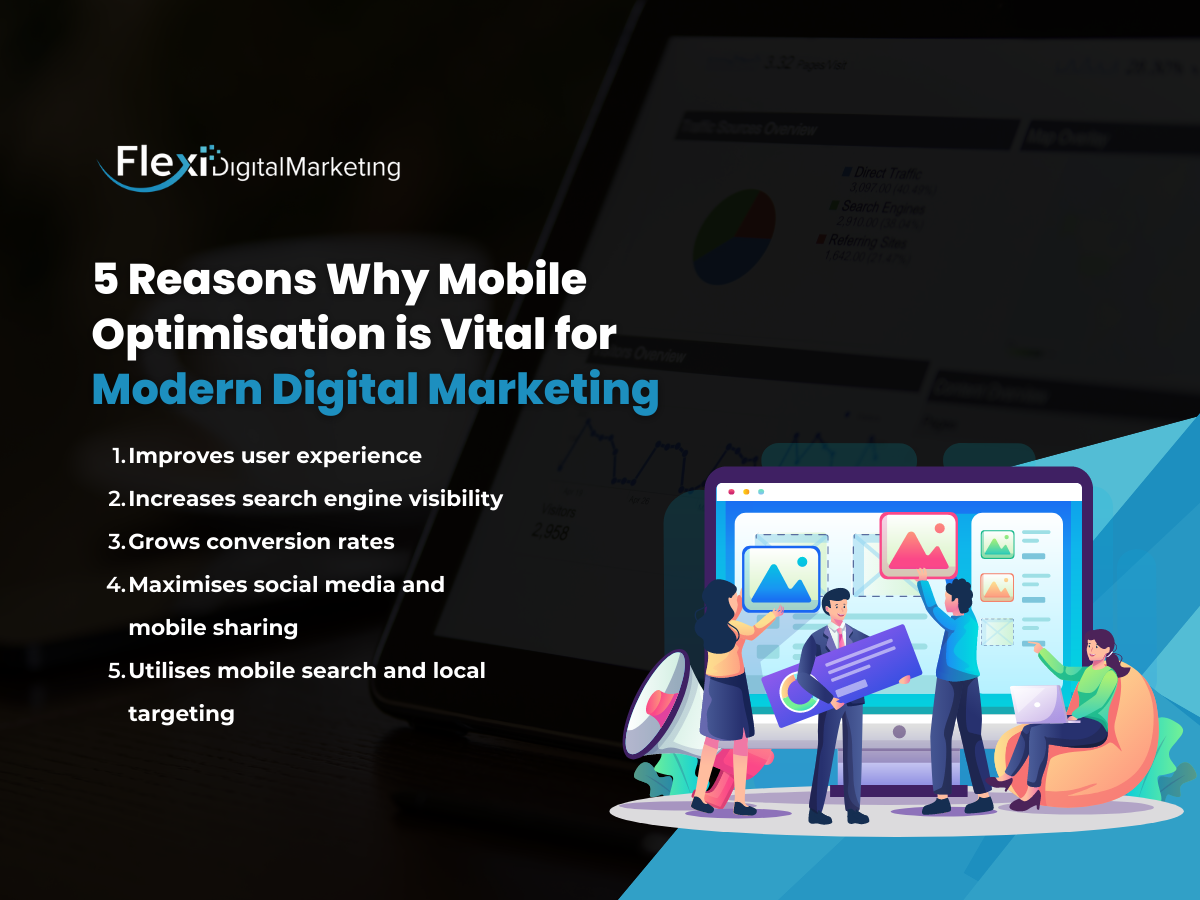In today's fast-paced digital landscape, smartphones have become integral to our daily lives. Many use their phones to easily do matters in their life – from banking to purchasing a product. That is why mobile optimisation has emerged as a crucial aspect of successful digital marketing strategies.
Most online users access content through mobile devices. In fact, Mobile phones account for 59.16 percent of the total website traffic generated in 2022. Thus, businesses must prioritise creating seamless and engaging experiences for their mobile audiences.
This article delves into five compelling reasons why mobile optimisation is no longer a luxury but a necessity for modern digital marketing.
What is mobile optimisation?
Mobile optimisation refers to the process of adapting and tailoring a website, application, or digital content to ensure that it functions seamlessly and efficiently on various mobile devices, such as smartphones and tablets. The primary goal of mobile optimisation is to create an optimal user experience for visitors accessing the content from smaller screens and touch interfaces.
Likewise, this involves optimising the digital asset's design, layout, navigation, and overall performance to accommodate mobile devices' unique characteristics and constraints. Mobile optimisation aims to ensure that users can easily access, interact with, and navigate through the content, regardless of their device, ultimately enhancing user satisfaction and engagement.
Why is mobile optimisation important in modern digital marketing?
As mentioned earlier, mobile optimisation holds significant importance in modern digital marketing due to the prevalence of smartphones and tablets. As more people use mobile devices as an integral part of their life, incorporating mobile optimisation into digital marketing is crucial for compelling reasons such as:

1. Improves User Experience
User experience (UX) stands at the forefront of any successful marketing endeavour. A positive user experience encourages users to stay on a website and significantly influences their purchasing decisions.
Likewise, one importance of mobile optimisation is that it enhances user experience. Mobile optimisation directly impacts UX by ensuring that websites are responsive, visually appealing, and easy to navigate on various mobile devices. It enhances load times, which is crucial in capturing and retaining user attention.
Through mobile optimisation, businesses can deliver a smooth and enjoyable browsing experience, resulting in longer visit durations and increased engagement.
2. Increases Search Engine Visibility
Another importance of mobile optimisation is its relevance to Search engine optimisation. SEO is a cornerstone of digital marketing, and mobile optimisation has become an integral part of it. Major search engines like Google consider mobile friendliness as a ranking factor.
Websites that are optimised for mobile devices are more likely to appear higher in search engine results pages (SERPs), leading to increased visibility and organic traffic. A website must be mobile optimised to rank well in mobile search results, ultimately missing out on significant potential traffic.
By implementing mobile optimisation best practices, businesses can align with search engine algorithms and enhance their chances of being discovered by their target audience.
3. Grows Conversion Rates
Conversions are the goal of any digital marketing campaign. Whether making a purchase, signing up for a newsletter, or filling out a contact form, conversions drive business growth.
As such, another importance of mobile optimisation in digital marketing is its direct impact on conversions. A well-optimised mobile site ensures that call-to-action buttons, forms, and checkout processes are easy to use on smaller screens.
Moreover, it helps provide simplified navigation and user-friendly interfaces and reduces friction in the conversion process. It eliminates barriers that might hinder users from completing desired actions on mobile devices, making it more likely for users to act.
Additionally, a mobile-responsive design provides a consistent experience across devices, allowing users to seamlessly transition from desktop to mobile without losing interest or momentum.
4. Maximises social media and Mobile Sharing
In the contemporary digital landscape, where social media has evolved into a central hub for information sharing and interaction, the role of mobile optimisation has become paramount. According to BankMyCell, A staggering 99% of social media users, which translates to approximately 4.43 billion individuals, utilise mobile devices to access various social networks.
As such, businesses need to ensure mobile optimisation. People frequently share interesting or valuable content on various social media platforms. When users encounter mobile-friendly content, they are likelier to engage with it and share it across their social networks. Non-optimised content that appears distorted or requires zooming in on mobile devices can deter users from sharing, leading to missed opportunities for content virality.
By ensuring that shared links lead to mobile-optimised landing pages, businesses can tap into the power of social sharing and amplify their reach.
5. Utilises Mobile Search and Local Targeting
The rise of mobile devices has also led to a surge in mobile searches, many of which are driven by local intent. Users often use smartphones to find nearby businesses, products, and services.
Likewise, another importance of mobile optimisation is that it drives mobile search and local targeting. This allows businesses to capture these highly relevant and intent-driven leads.
Companies should optimise for location-based searches by integrating location-specific keywords, creating localised content, and ensuring accurate contact information. Through this, businesses can connect with users actively seeking their offerings within their vicinity. This makes mobile optimisation an essential strategy for brick-and-mortar businesses looking to drive foot traffic and increase local visibility.
Conclusion
As the mobile landscape evolves, businesses must focus on mobile optimisation. They should prioritise mobile optimisation to position their website better, stay ahead of the competition, and effectively engage their target audiences. In a world where users demand seamless and relevant experiences, embracing mobile optimisation isn't just a choice—it's a vital component of a successful digital marketing strategy that drives growth and customer satisfaction.
Likewise, to fully capitalise on these advantages and create a robust digital presence, it's crucial to partner with experts who understand the intricacies of mobile optimisation. That's where Flexi Digital Marketing comes in. With a proven track record of crafting exceptional online experiences, Flexi Digital Marketing is your go-to solution for building a mobile-optimised website that stands out in today's competitive market. Contact us now!


